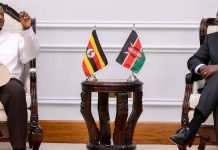By Faridah N Kulumba
Africa-Press – Uganda. In February 2020, Uganda was placed on the Financial Action Task Force (FATF) watch list and subsequently on the European Union money laundering watch list, which raised concern, with many Ugandans fearing how being placed on the grey list reflects on the economy that has been affected so much by Covid-19 pandemic.
About FATF
FATF is an intergovernmental policy-making body that determines Anti-Money-Laundering (AML) and Countering the Financing of Terrorism (CFT) standards to safeguard the global financial system. It is based in Paris and was created in 1989 at the behest of the G7 political forum to combat money laundering.
Money Laundering
Money laundering is the act of concealing, disguising converting, transferring, or removing criminal property and making it appear to have come from a clean source. Money referred to as “dirty money” because it is from criminal activities is cleaned through a process of investing it into business activities deemed legitimate.
Conditions
Soon after Uganda was placed on the grey list, a set of conditions were set by the FATF for Uganda to exit the list. The Financial Intelligence Authority (FIA) intensified its efforts in order to fulfill the conditions.
Panic
In May this year, there were genuine fears that Uganda was destined to be on the FATF blacklist. Mr. Sydney Asubo, the executive director of the FIA a government body that is, among others, charged with enhancing and identifying proceeds of crime and combating money laundering and terrorism financing told journalists that the country is not yet on the blacklist of the Europen Union. The fear was that if the EU put the country on the grey list, the United Kingdom automatically puts that country on its blacklist.
When Uganda was assessed in 2016, a number of issues were identified and a review in 2020 found that some issues were still not addressed. There were 22 particular action items. These were to be addressed by January, but the deadline was pushed by four months due to the Covid-19 pandemic disruptions.
Relief
On 17 June this year, Uganda’s government officials heaved a sigh of relief after the FATF opted against placing the country on a blacklist. The communication from FATF stated that although Uganda was not put on the blacklist, the country was to remain on the grey list that captures deficiencies in their Anti-Money Laundering/Combating the Financing of Terrorism (AMI/CTF) control.
Strategies
The FIA shared an update on how far Uganda has gone in fulfilling some of the requirements that were set by the FIA.
Matia Kasaija the minister of Finance, Planning, and Economic Development, spearheaded a direct line of communication between Uganda and FATF in a bid to liase with the body to come up with strategies to help Uganda to have a solution to remove them from the grey list.
Proposed strategy
One of the proposed strategies includes the creation of a taskforce, whose role is to advise the minister on policy and operational matters in trying to fight money laundering in Uganda.
Why Uganda is so concerned about being on the grey list
Uganda being on the grey list should be a major concern for a number of reasons. Firstly, in essence, transactions originating from Uganda or made through Uganda’s financial system including cash are subjected to more scrutiny by the international systems. This results in delays in concluding business transactions increasing turnaround time and transaction cost.
Secondly, Uganda risks being expunged from the Society for Worldwide Interbank Financial Telecommunication (SWIFT), an undesirable situation that can plunge the economy.
Thirdly, given that major financial institutions like the International Monetary Fund (IMF) and World Bank are affiliated with FATF as observers, Uganda risks facing complications in accessing international lending instruments. Even when there are no economic sanctions imposed, the due diligence required before Uganda can access loans from major financial institutions makes such loans unpalatable with tighter conditions.
About SWIFT
SWIFT is the global financial system that allows the smooth and rapid transfer of money across borders. Because we live in a global village, and trade globally, this is the last place where Uganda wants to be where the country cannot use dollars or euros to transact.
Countries on blacklist
The only two countries that were put on FATF’s blacklist include North Korea and Iran.
Countries on the grey list
The grey list has 23 countries including Uganda, Albania, Barbados, Burkina-Faso, Cambodia, the Cayman Islands, Gibraltar, Haiti, Jamaica, Jordan, Mali, Morroco, Myanmar, Nicaragua, Pakistan, Panama, Philippines, Senegal, South Sudan, Syria, Turkey, the United Arab Emirates (UAE), and Yemen.
What next
Uganda has to amend the Financial Institutions Act that sets up the Financial Intelligence Authority (FIA) such that it has powers to investigate and prosecute this matter.
Ugandan authorities should implement an action plan to address the strategic deficiencies. This includes developing and implementing risk-based supervision of financial institutions and Designated Non-Financial Businesses and Professions (DNFBP) such as churches and real estate.
For More News And Analysis About Uganda Follow Africa-Press






